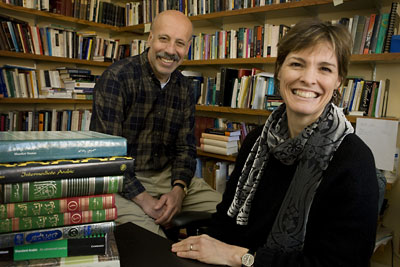CU to launch yearlong intensive Arabic language program
By Daniel Aloi

In fall 2009, the Department of Near Eastern Studies will launch its Intensive Arabic Program (IAP), a yearlong language immersion program with a full semester of language study on the Cornell campus and a semester living and studying in Jordan.
The pilot program will be directed by Munther Younes, a Reis Senior Lecturer in Arabic Language and Linguistics and director of the Arabic Language Program.
IAP students will take 16 credit hours of language study in the fall, with courses in Intermediate Arabic I and II and Advanced Arabic I and II -- a complete second- and third-year curriculum in one semester. Students can take the equivalent of first-year Arabic, a prerequisite to IAP, during the academic year or in an intensive summer program.
Students, accompanied by Younes, will live in Zarqa, Jordan, the following semester. Their classes at Hashemite University, taught entirely in Arabic, will examine the language's structure and history, Arab society and culture, and current events in Arabic media. Students will write papers in Arabic, incorporating library and field research, and will develop fluency through discussion, presentations and written work. Their studies in Jordan will be enriched by community service requiring use of the language.
Younes is the author of three Arabic textbooks, including "Elementary Arabic: An Integrated Approach" (1995), which has been updated as "Living Arabic" (2007). In integrated study, students review both formal written Arabic and the conversational form, Modern Standard Arabic.
"When I studied abroad in Jordan, I realized that because of studying Arabic at Cornell specifically, it was easier for me to communicate with locals than it was for some of the other students in the program when we first arrived," said Ruth Kelty '09, a Near Eastern studies major.
In teaching written and spoken Arabic at the same time, Younes said, "we reflect the situation exactly as it is in the Arab world, where Arabs use a spoken dialect for conversation and the written language -- known in Arabic as Fusha -- for reading, writing and formal or scripted speech. The result is that when our students go to the Arab world, they are able to function much more easily than students in other programs."
Kim Haines-Eitzen, chair of Near Eastern Studies, said many Cornell students have expressed "very serious interest" in the program. Some students "even changed their curriculum this year in order to take this next year," she said.
"The goal of this program is the ability to communicate with people of diverse cultures through spoken Arabic, and also to be able to read and write Arabic -- but the broader vision is communication as a step to cross-cultural understanding," Haines-Eitzen said.
The program is modeled in part on Cornell's Full-year Asian Language Concentration (FALCON) Program and the China and Asia-Pacific Studies (CAPS) Program. It is being supported by an anonymous gift for its first four years.
Two Reis senior lectureships, held by Younes and Hanada Al-Masri, have strengthened Arabic studies at Cornell since 2001, Haines-Eitzen said.
"That gift helped us to launch a very strong and vibrant program that has allowed us in this past year to think about developing it even further," she said. "The long-term goal is to open this program up to professionals who want to learn Arabic."
Enrollment in IAP will be limited to 12 undergraduates from any Cornell college. Interested students are encouraged to enroll as soon as possible. Scholarships are available, and no extra fees are required.
For information contact Younes at may2@cornell.edu or Chris Capalongo at cmc40@cornell.edu.
Media Contact
Nicola Pytell
Get Cornell news delivered right to your inbox.
Subscribe